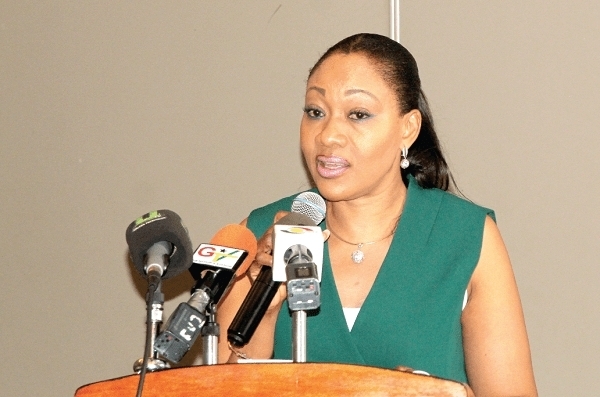Walking Ghana into Kenya 2007? What the EC and international stakeholders of elections should know!
 Jean Mensah, EC boss
Jean Mensah, EC boss
With barely four weeks to Ghana’s elections on December 7, 2024, searing tensions persist over unresolved concerns regarding the integrity of the electoral register and the perceived ability of the Electoral Commission (EC) to conduct free and fair elections.
Controversies surrounding the integrity of the EC have intensified, with electoral campaigns facing widespread calls for transparency mainly championed by the main opposition National Democratic Congress (NDC), which recently organized a nationwide demonstration on September 17.
Its chief demand being a forensic audit of the voter register, citing discrepancies that render it unfit for the upcoming elections.
Despite urgent calls and waves of protests, the grandstanding and seeming nonchalant posturing of the EC, has only reinforced doubt amongst its detractors as a signal of its unwillingness to address the growing demands for transparency in the upcoming December 7 elections!
As negotiations between the (NDC) and the EC stall, public trust and credibility in the EC is waning, raising the risk of post-electoral unrest.
This looming threat of post-electoral civil unrest, most likely to be caused by the severe crisis of trust in the EC are similar to performance concerns that led to Kenya’s 2007 post-election violence and thus deserves urgent attention.
The EC, led by Jean Mensa is facing integrity and credibility issues due to persistent data errors and oversight blips, casting a doubt on its ability to conduct free and fair elections.
The Kenyan example shows that similar flaws in vote tallying coupled with a 72-hour delay in announcing the final presidential results triggered the tragic post-election violence and civil unrest.
The mayhem resulted in the deaths of more than 1,200 people, thousands of injuries, and cases of sexual violence.
The chaos also led to a widespread destruction of property, including the displacement of over 300,000 people, the looting and destruction of 42,000 homes and many businesses, causing economic losses of over $1 billion and deterring potential investors.
Coming events as they say, cast their shadows before them!
In the aftermath of the 2012 and the 2020 elections, the NPP and the NDC respectively sought redress having made allegations of electoral fraud against the EC from the supreme court.
Both were dissatisfied with the court ruling.
The NDC has since indicted that court will not be an option for redress of their grievances in the event of electoral fraud against them in the 2024 elections.
We are thus in a situation where the EC seems to be walking Ghana into Kenya 2007.
The Kenyan crisis, which brought the country to a standstill due to errors by the Independent Electoral and Boundaries Commission (IEBC) and widespread mistrust, serves as a crucial lesson for fragile electoral management bodies (EMBs) worldwide.
As Ghana grapples with a persistent lack of trust in its EC, I draw on the poignant example of Kenya to illustrate the dangers of unresolved pre-electoral concerns, and to recommend critical stop-gap measures for the EC and international stakeholders in the democratization process to learn from Kenya's experience and prevent similar turmoil in Ghana.
First, The EC must pay attention to its overreliance on its power of de jure (formal-legal) autonomy in all its stakeholder engagements.
Too often, the EC tends to dismiss concerns about manipulation by emphasizing their formal autonomy, arguing that being de jure independent protects them from political influence.
This posture complicates matters as de jure autonomy does not automatically translate to de facto (in practice) independence, perceived trust and confidence in the EC among the public.
Actual independence—marked by trust and confidence in Electoral Management Bodies (EMBs)—is not guaranteed by legal frameworks alone.
While having an officially independent institution with administrative and financial autonomy is essential, that alone is insufficient to establish genuine electoral independence.
Studies have found that mere legal frameworks do not guarantee actual independence or public trust.
In most developing countries, formal-legal electoral autonomy has not proven to guarantee or correspond to actual independence and public trust.
Voters respond more to perceived bias in electoral administration that may well linger even after efforts are made to insulate electoral administration from partisan influences.
As evidenced by the Kenya situation, constitutional reforms in Kenya (2010) created new electoral regulatory frameworks that introduced formally independent EMBs, but this failed to translate into de facto autonomy and positive perception of trust.
Also, despite the nominal structural independence of election commissions in several countries including Nigeria, Ethiopia, and Kenya, perceived biases in electoral management have led to political unrest despite the existence of supposedly independent Electoral Management Bodies (EMBs).
In fact, the historical success of Ghana’s EC can be attributed to its de facto autonomy, cultivated through informal stakeholder engagement and collaboration via the Inter-Party Advisory Committee (IPAC), which has fostered trust and communication with political entities.
It is therefore important for the EC not to exaggerate its power of autonomy.
Its success has not been because of its de jure autonomy but its de facto autonomy!
This does not suggest that formal rules (legal independence) do not matter.
They do matter and are important, but the essence of electoral credibility lies more in building perceptions of neutrality and competence among EMBs.
Legal autonomy is only a part of the equation for establishing credible electoral processes, and the EC must actively work to foster a perception of impartiality to gain public confidence.
The EC must therefore avoid overstating the power of formal autonomy as this often hinders consensus building and overlooks the critical importance of legitimacy and perceived independence in the eyes of the public.
Second, in the short run, the EC must urgently address the systemic failures, technical glitches, and human errors that have plagued the commission.
These recurring flaws, whether viewed as unintentional or deliberate, can foster perceptions of bias and significantly undermine electoral integrity, potentially leading to post-electoral violence.
The 2013 Kenyan elections serve as a cautionary tale, where malfunctions in high-tech voting systems and software glitches hindered the transmission of results, culminating in violence despite the issues being largely unintended.
The Ghanaian EC should avoid missteps like the errors during the 2020 election results announcement and must proactively address allegations regarding its staff's political affiliations to maintain credibility. Transparency in clarifying these accusations, along with the temporary recusal of implicated individuals from sensitive roles during investigations, is crucial.
Moreover, timely announcement of election results is essential to prevent suspicion and potential unrest, as delays can signal manipulation and exacerbate fears of vote fraud, leading to post-electoral uprising, as exemplified by the 2007 Kenyan elections.
Third, for the long term, the Electoral Commission (EC) and stakeholders must institutionalize the Inter-Party Advisory Committee (IPAC) to reinforce its demonstrated role in fostering de facto autonomy and enhancing the EC's reputation.
Despite lacking constitutional and formal recognition in Ghana's electoral framework, IPAC has proven to be essential for the EC's success, and experts have widely acknowledged its importance in promoting electoral credibility.
The Special Reform Committee established by the EC in the aftermath of the 2012 elections highlighted the need to formalize this informal system to improve transparency and inclusiveness.
The reluctance to institutionalize IPAC often stems from concerns about excessive party influence over administrative decisions , yet it serves as a vital consultative link between political parties and the EC, mitigating vulnerabilities.
By fostering dialogue and addressing partisan tensions, IPAC can bolster the EC's autonomy and enhance public perception, while also acting as a check on its de jure authority to ensure impartial decisionmaking. This was the problem in the case of Kenya.
Before 2007, the Kenyan electoral body was formally insulated from external actors but the link between them and political parties was missing, and they became vulnerable to external pressures.
Additionally, the EC must invest in building its competence and capacity.
The recent incident where officials of the EC repeatedly published wrong data during the voter’s registration exercise and later attributed the mistake on the use of CorelDraw depicted the competence deficit of its personnel.
Elementary errors of this nature, calls for the need to invest in developing the capacity of staff in modern data analysis techniques.
In a politically polarized environment, such competence deficits can lead to perceptions of bias and inadvertently facilitate partisan manipulation.
Thus, addressing these issues is critical for maintaining integrity and public trust in the electoral process.
I conclude by urging the stakeholders of Ghana’s democracy including independent observer missions, diplomatic missions and the international community at large to deepen consultations with the EC and exact greater accountability from the electoral management body.
I believe outside observers can play a proactive role by mediating between the Jean-Mensah led EC and the main opposition NDC to resolve outstanding tensions between the two parties before they escalate in the December 7th elections.
Dr. Ghadafi Saibu President and CEO of the Institute of Comparative African Policy Analysis (ICAPA), and an Associate Researcher at the German Institute of Development and Sustainability (IDOS)
Source: Dr. Ghadafi Saibu






